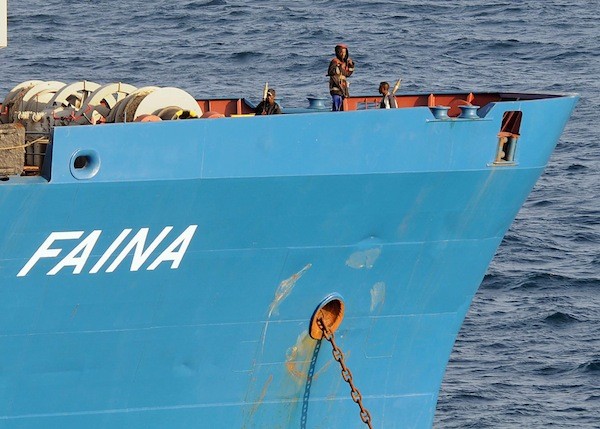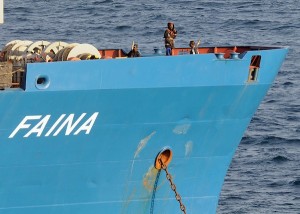Piracy Reporting Centre: Singapore Straits Emerge as Piracy Hotspot
Global piracy and armed robbery incidents against ships have risen sharply in the first quarter of 2025, with a notable 35% increase compared to the same period last year. The...

 Today’s Pirates Have Their Own Stock Exchange; Western powers patrol the seas but do little to stop pirate financing.
Today’s Pirates Have Their Own Stock Exchange; Western powers patrol the seas but do little to stop pirate financing.
By Avi Jorisch
Pirates are on a hot streak this season. World-wide, the first quarter of 2011 saw 142 recorded attacks, up from 67 in that time last year. Off the coast of Somalia there were 97, as against 35 last year. Why? Despite some efforts by Western powers to patrol the Horn of Africa, pirates are still able to access capital, as any successful business must.
The world’s first pirate stock exchange was established in 2009 in Harardheere, some 250 miles northeast of Mogadishu, Somalia. Open 24 hours a day, the exchange allows investors to profit from ransoms collected on the high seas, which can approach $10 million for successful attacks against Western commercial vessels.
While there are no credible statistics available, reports from various news sources suggest that over 70 entities are listed on the Harardheere exchange. When a pirate operation is successful, it pays investors a share of the profits. According to a former pirate who spoke to Reuters, “The shares are open to all and everybody can take part, whether personally at sea or on land by providing cash, weapons or useful materials. . . . We’ve made piracy a community activity.”
The big player on the Harardheere exchange is a pirate named Mohammed Hassan Abdi, who goes by the name of “Afweyne,” or “Big Mouth.” Known as the “father of piracy,” Abdi and his son Abdiqaadir are in charge of the exchange and are, according to a recent United Nations report, among the best-known pirates in the area. Abdi’s boats have hijacked a variety of ships, including the German freighter Hansa Stavanger, which German special forces tried unsuccessfully to liberate in 2009. After a four-month hostage ordeal, the pirates released the ship off the coast of Kenya.
Piracy has changed Harardheere from a small fishing village to a town crowded with luxury cars. As local security officer Mohamed Adam put it to Reuters, “Piracy-related business has become the main profitable economic activity in our area and as locals we depend on their output.” Mr. Adam claims that the district government gets a cut of every dollar collected by pirates and uses it—naturally—for schools, hospitals and other public infrastructure.
Cutting off these financial relationships is essential to curbing piracy. The U.S. could begin by instituting, via executive order, a sanctions regime against these rogue actors. Just as the government maintains lists of terrorists, narco-traffickers, weapons proliferators and money launderers, so too should it keep a list of pirates. This would heighten international awareness of piracy and give banks an additional tool to employ against illicit actors. Pirates, like all other criminals, eventually use the banking sector to try to hide their criminal gains.
The U.N. and other international organizations—such as the Financial Action Task Force (FATF), an intergovernmental body that sets standards regarding terrorism finance and money laundering—also have roles to play. For one, the U.N. should expand its current Somalia and Eritrea monitoring committee, which was established in 1992 to implement the U.N. travel ban, asset freeze, and arms embargo on Somalia, as well as the arms embargo on Eritrea. An expanded committee could improve the anti-piracy intelligence-gathering capabilities of its members and track the finances of significant international pirates.
For its part, the FATF could get serious about including piracy within its mission of highlighting how money launderers and terrorists raise and move funds. To date, the organization has never issued a report on piracy. Doing so would prod a variety of international organizations, policy makers, law-enforcement agencies, and banking authorities to grapple seriously with this threat.
There are four banks in Somalia today—the Central Bank, the Commercial and Savings Bank of Somalia, and the Somali Development Bank (all of which are wholly or partly owned by the government), as well as the independent Universal Bank of Somalia. International financial institutions providing correspondent banking services to the four, or wiring money into or out of the country, should carry out enhanced due diligence on all transactions to make sure they are not related to piracy or the Harardheere stock exchange. In Washington, the Treasury Department could mandate this standard of care by issuing guidance to all American financial institutions.
Piracy increases the cost of international commerce by $12 billion annually, and in Somalia alone more than 20 vessels and 400 hostages are currently being held, according to the International Chamber of Commerce. The U.S. and others have a duty to deploy their financial firepower against this threat.
About the Author: Mr. Jorisch, a former U.S. Treasury official, is president of the Red Cell Intelligence Group and the author of “Tainted Money: Are We Losing the War on Money Laundering and Terrorism Finance?” (Red Cell IG, 2009).
Copyright 2011 Dow Jones & Company, Inc. All Rights Reserved.
Photo: After months in captivity, the M/V Faina and her crew were released after a ransom payment of US $3.2 million. U.S. Navy photo by Mass communication Specialist 2nd Class Jason R. Zalasky

Sign up for gCaptain’s newsletter and never miss an update

Subscribe to gCaptain Daily and stay informed with the latest global maritime and offshore news


Stay informed with the latest maritime and offshore news, delivered daily straight to your inbox
Essential news coupled with the finest maritime content sourced from across the globe.
Sign Up